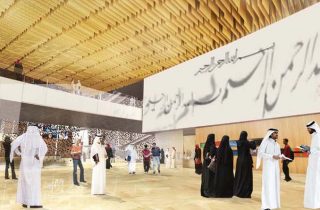
Northwestern University in Qatar (NU-Q) has renewed its contract with Qatar Foundation for another 10 years, as construction of its permanent home in Education City finally nears completion.
The journalism and communications school will now operate in Qatar until at least 2028.
NU-Q dean and CEO Everette Dennis announced the new deal, first reported by The Daily Q, in an email to the university community last week.
While he said the renewal of the current agreement – which expires in 2018 – was “anticipated,” he also called it a “new lease on life for NU-Q.”

The school opened its Qatar campus in 2008 and is one of six American universities operating in Education City.
Over the past several years, it has drawn scrutiny for teaching Western-style journalism in a country that’s been criticized for its lack of media freedom.
Some students have even been arrested while covering stories, and others have recounted incidents of intimidation by police.
In an email to Doha News, a school spokesperson said the financial details of the agreement were confidential, but confirmed that QF covers NU-Q’s operating costs.
Though many QF schools have undergone budget tightening in recent years, the spokesperson added that there were no major changes between the current deal and the new agreement, which will start in the 2017-18 academic year.
New building
NU-Q’s operations are currently divided between space inside Carnegie Mellon University in Qatar’s building as well as a temporary studio structure.
However, after years of delays, NUQ’s permanent building is nearly complete.
The new 515,000-square-foot (47,845 square meters) facility is scheduled to be occupied during the 2016-17 academic year, although a specific opening date has not been set.
The building broke ground in 2011 and was originally supposed to open in 2013.
Additionally, plans to develop a master’s degree program “will take shape” once NU-Q moves into its new building, the spokesperson said.
NU-Q currently has 207 students and 32 faculty members. Since launching, the school has graduated nearly 140 students, according to NU-Q’s 2014-15 annual report.
Academic freedom
Qatar’s media is ranked “not free” by US think tank Freedom House and the Gulf state’s ranking on Reporters Without Borders’ annual press freedoms list has slipped for two straight years.
This makes NU-Q’s journalism program a curiosity for many observers, especially those outside the country.

Last year, Stephen Eisenman – who was president of Northwestern’s faculty senate at the time – traveled to Qatar on a three-day visit to investigate academic freedom and freedom of inquiry at NU-Q, among other questions.
The art history professor subsequently wrote a six-page report is which he suggested there is a degree of self-censorship on campus, although it doesn’t appear to be hurting the school’s quality of education:
“NUQ students, judging by their spoken responses to my questions, appear to have internalized many speech restrictions and willingly operate within them. They nevertheless also appear able to conduct serious journalistic and other academic inquiry.”
For their part, NU-Q administrators and staff members have consistently denied they face any restrictions in the classroom.
“Students write stories about guest workers, sexuality issues, all kinds of controversial subjects,” Dennis told the New York Times in 2013.

In his report, Eisenman raised more serious concerns about academic freedom at NU-Q. He said the use of one, two and three-year contracts leave staff vulnerable and that the only way to guarantee complete academic freedom is to employ tenured faculty.
Dennis told Northwestern’s home campus publication The Daily that long-term contracts were impractical at NU-Q because the school’s contract needs to be renewed every decade with QF.
As a compromise, Eisenman suggested in his report that five-year appointments be considered.
NU-Q did not respond to a question on whether this recommendation would be adopted now that the school’s future is secure until the 2027-28 school year.
Thoughts?










